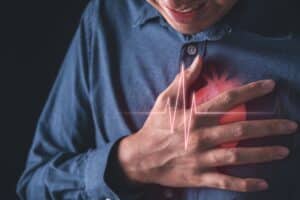
A heart attack can cause an acquired brain injury in a matter of a few minutes. When the heart stops or changes to a rhythm that will not support adequate blood flow, the brain must do without oxygen-rich blood. This damages the affected areas of the brain, causing a heart attack acquired brain injury (ABI).
Shocking a patient with a defibrillator and performing CPR can restart the heart and pump blood properly again. Providing this life-saving rescue care in the first minutes after a heart attack is the best way to prevent or limit brain damage after a massive heart attack.
Heart Attacks Can Cause ABIs in Less than Five Minutes
If your heart fails to continue pumping regularly, this cuts off the blood supply to the brain and other vital organs. The longer your organs go without a fresh supply of oxygenated blood, the more damage is likely to occur. When the brain lacks oxygen for more than a couple of minutes, neural cells begin to die.
This means you may suffer severe brain damage if you do not get emergency medical help within minutes of your heart attack. When witnesses begin CPR, or trained bystanders administer an AED shock and perform CPR, the outcome is better than if they must wait for first responders to arrive. First responders may be able to save your life, but whether they can prevent a heart attack acquired brain injury depends on a number of factors.
The more quickly your heart begins to beat again and you get oxygen to your brain, the better the outcome. A quick response with an AED and other rescue measures limits the damage to your brain.
An ABI Affects You in Many Ways
Every brain injury is different, affecting different areas of the brain and in different ways. There is no way to predict the prognosis of a loved one who suffered a brain injury during a heart attack until their doctors can fully evaluate their situation. Even then, it is difficult to know which symptoms will become lasting impairments.
Some symptoms and effects of a heart attack acquired brain injury may include:
- Loss of consciousness
- Impairments related to mobility and dexterity
- Loss of speech, or trouble finding the right words
- Disorientation and confusion, feeling “dazed”
- Poor concentration and focus
- Slowed response times
- Loss of short-term memory and other memory issues
- Severe fatigue, difficulty staying awake, and other sleep disorders
- Dizziness and balance issues, problems with coordination
- Headaches
- Double vision
- Loss of sense of smell
- Deafness or ringing in the ears
- Emotional and behavioral changes
- Drastic changes in personality
- Epilepsy and seizures
Treatment and Rehabilitation After a Heart Attack and ABI
Heart attacks can lead to a wide range of brain injuries, from mild to severe. While some people bounce back from relatively minor brain injuries in a few weeks, others require intensive inpatient rehabilitation. Many people need some type of therapy to help them regain strength and relearn skills after suffering from brain damage. Therapy options include:
- Physical therapy
- Cognitive therapy
- Occupational therapy
- Speech therapy
In some cases, the goal is not to fully recover, but to adapt to lasting impairments. Regaining as many skills as possible is a key part of regaining independence and learning to take care of yourself after a brain injury. Some people who suffer an ABI never fully regain consciousness or regain consciousness but cannot move or communicate. In these cases, ongoing care is imperative. This situation requires at-home nursing care, placement in a long-term care facility, or other around-the-clock care.
Heart Attacks and Civil Suits for Compensation
We do not always think of a heart attack leading to a negligence lawsuit, but there are many situations when failure to prevent or treat a heart attack leads to more serious brain injuries.
Imagine your loved one suffered a heart attack at the gym. While staff noted their condition immediately, the facility’s defibrillator lacked proper maintenance and did not work. At the same time, there was a delay in calling first responders. When the paramedics finally arrived, they were able to shock your loved one’s heart back into rhythm. However, your loved one’s brain went without adequate blood flow for more than five minutes.
If your loved one suffered a heart attack and ABI because of someone else’s negligence, the personal injury team from Newsome | Melton will review your case for free. We have over two decades of experience fighting to protect the rights of victims like you. Let us pursue compensation for all your damages and get you the settlement you deserve.
Call us today to learn more about how we can help you if you or your loved one suffered a heart attack acquired brain injury: (800) 917-5888.
